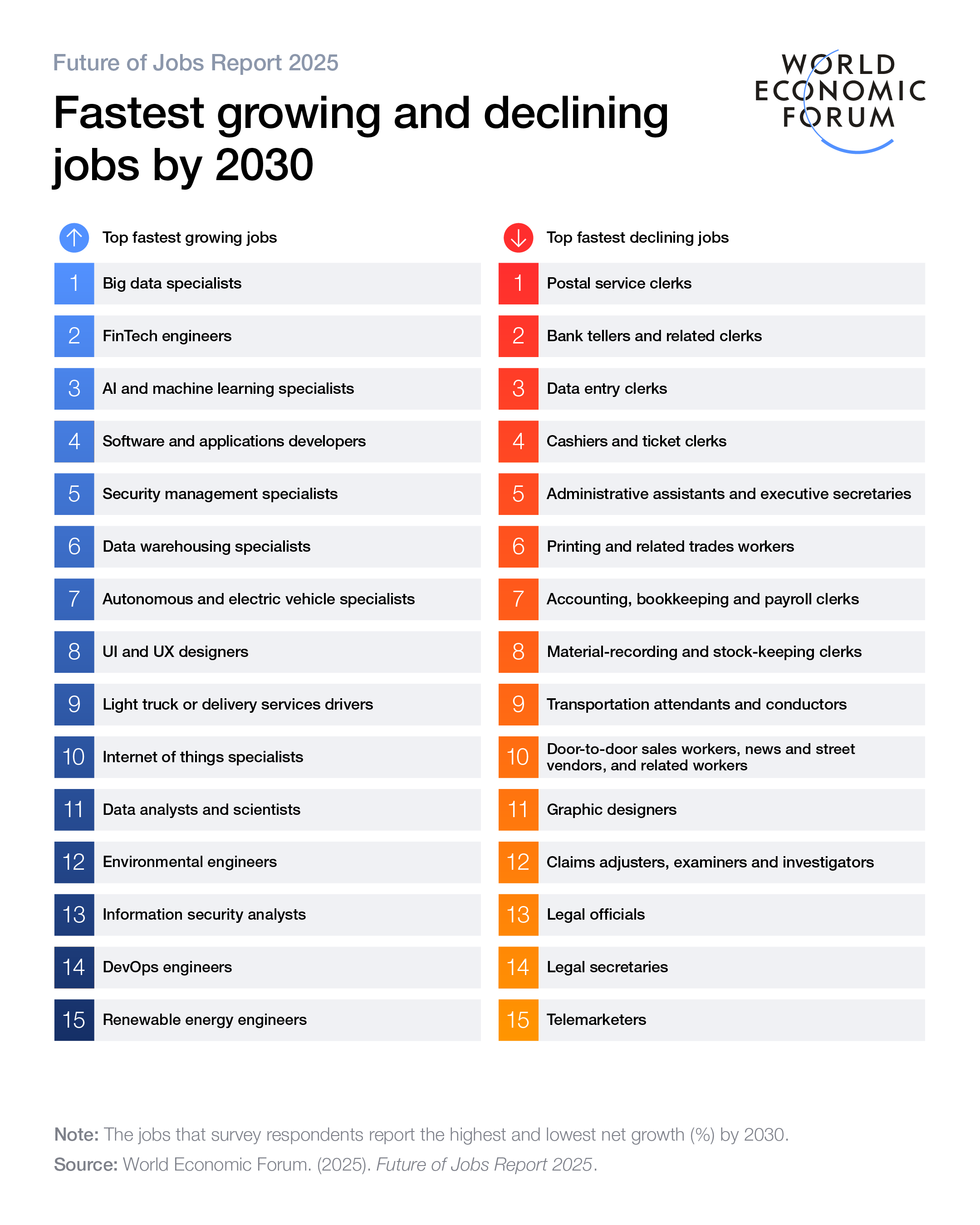The Transformational Impact of Emerging Technologies on the Global Workforce by 2030
The World Economic Forum has recently published its Future of Jobs Report 2025, presenting a comprehensive outlook on how various factors such as technology, economic shifts, changing demographics, and the transition towards green energy are set to redefine global labor markets. By the year 2030, it’s projected that 92 million jobs will be displaced, but in a promising twist, 170 million new jobs will be created, resulting in a net increase of 78 million jobs. This transformation is largely driven by the rapid rise of generative AI technologies, which are increasingly being adopted worldwide, spurring a significant demand for training in this area.
The findings in the report are based on data collected from over 1,000 companies, highlighting a persistent issue: the skills gap. This gap is currently the most formidable barrier to business transformation, with around 40% of job skills anticipated to evolve. Furthermore, 63% of employers identify this gap as their primary challenge. As AI and other swiftly advancing technologies continue to reshape business models, they also necessitate new approaches for employee skill enhancement.
Key Insights and Trends in Employer Strategies
- AI-Driven Business Reorientation: Half of the surveyed employers are planning to realign their businesses in response to AI advancements. This indicates a broad acceptance that AI is not just an ancillary tool but a central component of future business strategies.
- Upskilling Initiatives: A significant 80% of companies intend to upskill their workforce with AI training. Moreover, two-thirds of these companies plan to hire talent equipped with specific AI competencies. Interestingly, only 40% are considering workforce reductions due to AI automation, suggesting that many see AI as a complement to human labor rather than a replacement.
- Bridging the Skills Gap: A substantial 85% of employers are committed to upskilling their employees to address skills deficiencies, with half of these businesses planning to transition current staff into roles that are experiencing growth.
- Process Automation and Talent Acquisition: 73% of companies plan to automate more processes. Additionally, 70% are looking to recruit talent with new skills, underlining the dual strategy of automation and human resource enhancement.
Emerging and Declining Job Roles
The report also identifies the fastest growing and diminishing job roles, heavily influenced by the developments in AI, robotics, and increased digital connectivity. These insights are crucial for both job seekers and employers to understand where opportunities and challenges may lie in the coming years.
The Role of Online Learning in Workforce Transformation
Online education platforms like Coursera are expected to play a pivotal role in bridging the skills gap, driving workforce transformation, and facilitating job transitions. The data from Coursera included in the Future of Jobs Report 2025 underscores a marked increase in demand for training in Generative AI among both individual learners and enterprises.
- In 2024 alone, there were nearly 7.4 million AI-related course enrollments on Coursera, with over 3.2 million specifically in Generative AI training. This equates to an average of six enrollments per minute, a significant leap from the previous year’s rate of two enrollments per minute. The highest enrollment numbers were recorded in India and the United States.
- Individual learners often concentrated on foundational and conceptual skills, including areas like prompt engineering, trustworthy AI practices, and strategic decision-making related to AI. These foundational skills are essential for understanding and leveraging AI technologies effectively.
- On the other hand, enterprise-sponsored learners were more focused on practical applications that could immediately enhance workplace productivity. This includes using AI tools to improve efficiency in applications like Excel or developing new AI-driven applications.
Expanding Educational Offerings
In response to the surging global demand for AI skills, leading technology companies and top-tier research universities have introduced over 670 courses and guided projects on Coursera. These educational offerings include GenAI-enhanced Professional Certificates, which are designed to prepare individuals without a college degree for digital roles increasingly requiring GenAI skills. Additionally, the GenAI Academy aims to equip organizations and their employees with GenAI literacy, leadership, and training tailored to specific high-impact job functions.
Collaborative Efforts for Future Preparedness
The rapid changes in the job market necessitate concerted efforts beyond individual initiatives. Companies, governments, and educational institutions must collaboratively work to identify emerging skill requirements and prepare the global workforce accordingly. Coursera, in partnership with various institutions worldwide, is committed to enriching skills strategies and transforming potential threats into opportunities for inclusive growth.
For those interested in understanding more about the global skills and jobs outlook, the World Economic Forum’s Future of Jobs Report 2025 offers detailed insights. Additionally, organizations looking to prepare their workforce for these upcoming challenges can explore resources available at Coursera’s business platform.
In summary, as we move towards 2030, the interplay of technology, economy, and education is set to redefine the global job landscape. Proactive engagement in skills development and strategic adaptation to AI advancements will be key to thriving in the new economic era. The potential for growth and innovation is vast, but it will require a unified effort from all sectors to fully realize this potential and ensure that the workforce is equipped for the future.
For more Information, Refer to this article.


































![Samsung’s Breakthrough Fuels Progress in Science and Industry: Interview How Samsung’s Engineering Feat Became a Catalyst for Scientific and Industry Advancement [Interview on Real Quantum Dots Part 2.]](https://www.hawkdive.com/media/samsung-tvs-and-displays-samsung-quantum-dots-technology-qled-tvs-quantum-dots-experts-interview-par-218x150.jpeg)